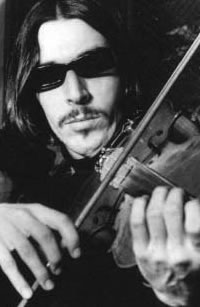

Timeline: 1966

Factory days
The Velvet Underground start rehearsing in the Factory at 231 East 47th Street in New York, the workshop run by Andy Warhol. The whole thing on the 4th floor is wrapped in silver by Billy Name:
"When we went up to the Factory it was a real eye-opener for me. It wasn't called the Factory for nothing. It was where the assembly-line for the silkscreens happened. While one person was making a silkscreen, somebody else would be filming a screen test. Every day something new. I think he was dipping into anything he fancied."

"The Velvet Underground and Nico: A Symphony Of Sound" movie
Andy Warhol and Paul Morrissey let the cameras roll on January 3 as the band tries to rehearse. Features of footage The Velvet Underground & Nico, Ari Boulogne (Nico's son), and appearances by Gerard Malanga, Billy Name, Stephen Shore, Andy Warhol. Nico's son Little Ari is playing quietly, despite the racket.

The rehearsal was stopped when the cops arrive after the neighbours had complained about the noise.
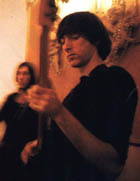
Psyching the psychiatrists
On the night of January 13 The Velvets play at the Annual Dinner of the New York Society for Clinical Psychiatry at Delmonico's Hotel, New York, and drive the audience crazy. It is the first public appearance with Nico.
It is the start of Up-Tight which expanded to the multimedia extravaganza The Exploding Plactic Inevitable, with split screen movies, dancers and the Velvets ripping though it.
The New York Times points out Cale as "the leader of the Velvet Underground".

"Lou, having had a painful experience, a brutal experience at the hands of psychiatrists with shock treatment was beside himself with glee at the idea of going and doing this. And we relished it. We went and did the show. We'd play in the grand ballroom, with candelabra, etc, etc. And we set up our amplifiers and we performed a blistering set and we assaulted their senses."
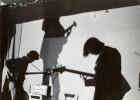
Residency at the Cinematheque in New York
In February the Velvet Underground play a bunch of shows at the Filmmakers' Cinematheque in New York, with a light show and various films to turn the performances into a multimedia event.
"Andy had high aims and big plans for the Velvet Underground, but first he had to whip his act into shape and bring the focus and volume to a shattering level. To this end he arranged a week-long engagement in mid-February at the Cinematheque, where underground movies were screened. We were in this tiny little theatre, playing as loud as possible, just victimizing the audience more than anything. There was a barrage of films on the screen, four or five films coming on at the same time, colour, black and white; spotlights, strobes and all that deafening music. Well, the Cinematheque got a lot of publicity anyway, and it got to the point were the publicity gave us enough time to get money to put a show together. Under the title Andy Warhol Uptight, we developed the multimedia show."
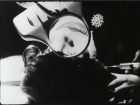
Playing with Lou Reed at Hedy screenings
He plays incidental music with Lou Reed during screenings of this Andy Warhol movie, featuring Mario Montez, Mary Woronov, Gerard Malanga, Jack Smith. It was inspired by ex-Hollywood star Hedy Lamarr's arrest and trial for shoplifting. Richie Unterberger in his book White Light/White Heat: The Velvet Underground Day by Day:
Only Lou Reed and John Cale are heard on the soundtrack to Hedy, a Warhol film inspired by press reports of the arrest for shoplifting of 30s and 40s actor Hedy Lamarr. None of the Velvets appear in the film, but the cast does include the two most celebrated dancers of the Exploding Plastic Inevitable - Gerard Malanga and Factory newcomer Mary Woronov - as well as another EPI dancer, Ingrid Superstar, and Cale's old friend Jack Smith.
The Hedy score is closer in spirit to the avant-garde recordings Cale and Angus MacLise appeared on during 1963-1965 than anything The Velvet Underground are currently playing. The music builds around an instrumental storm of shrieking, rumbling viola, guitar, and a rickety piano that sounds like it hasn't been played since doing time in a 19th century saloon, while Cale's 'thunder machine' - the sound made by the head of a Vox Super Beatle amp being dropped on the floor - occasionally cuts through everything else with hair-raising, high pitch bursts of feedback. This might be the closest approximation of how the nascent Velvet Underground sounded when they played, with Angus MacLise, behind the screen at Piero Heliczer's 'happenings,' but those days are rapidly becoming a thing of the past.

Meets Betsey Johnson at the Paraphernelia
In March fashion designer Betsey Johnson hired Warhol to stage a party at Paraphernelia, the flagship store of Pilgrim Clothes who had hired Johnson to design the clothes. The Velvet Underground performed at the party. Soon afterward Cale and Johnson become an item and she designed some clothes for The Velvets:
"[The Velvet Underground] were asked to come play at the opening. It was one of those crazy things that Andy was always partial to — he'd just throw a band in the middle of anything. It was this white store with boxes and marble. They asked us to play, and we didn't want to play, they asked us to play again, we said we don't want to play... It was sort of a testy situation, but the clothes were really stunning. It was recognizable to me that something different was going on in New York, very street-oriented, bustling with energy. So Betsey came and did some clothes for us. My aesthetic at the time was all black — black waistcoat, black turtleneck, black pants, and that was my comfort range. Then Betsey came along and — 'Hey, velvet! Oh, man, yeah, I'd like to get some velvet!' She made herself a pinstripe suit, and I said, 'Can I have a pinstripe suit?' 'No, you can't have a pinstripe suit.' 'All right, well, can I have a black velvet suit, please?' 'Yes.' Sterling [Morrison] got a beautiful deep forest green velvet suit, and Moe [Tucker] had a black one, and Lou [Reed] had a gray leather suit."
Photographer Nat Finkelstein:
"We staged a party in a fishbowl, a store window on Madison Avenue. Crowds gathered... the idea was that everybody who saw the party would buy clothes there. The girls showed the new fashion while they were dancing to the Velvet's music."
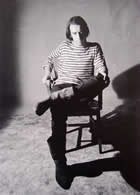
Screen test for Andy Warhol
All Factory visitors, regulars and hangers-on were dragged before the camera by Andy Warhol for a screen test.
This is a photo from such a session, reproduced in "GIANT" - A comprehensive visual biography of Andy Warhol compiled by Steven Bluttal and art critic Dave Hickey in 2006.

Police Car
Cale makes a short film called Police Car. No sound, and it is in black & white. Part #31 in the Fluxus Film series.
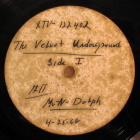
Recording in New York
The Velvets record tracks for their first album The Velvet Underground & Nico at Scepter Records Studios and Mayfair Studios in New York in April and May. Sunday Morning is recorded in November at Mayfair.
On April 25 engineer Norman Dolph makes two acetates from the Scepter sessions. It contains nine tracks in a different running order, all alternate tracks. One of those acetates pops up on eBay in 2006, listed by collector Warren Hill who paid $0.75 for it. It will be released officially on The Velvet Underground & Nico - 45th anniversary deluxe edition box set in 2012.
Norman Dolph looking back on the recording sessions:
"Warhol was in the control room for part of two of the four days John Licata and I worked on that record," he says. "He was never there for any eight-hour stretch: more like 30 minutes, during which he'd stand behind me, listen to a playback and say, 'Oh, yeah, yeah, that sounds great.' I don't think Warhol gave us the slightest instruction or command, and nobody really asked him what he thought of the recordings. Usually, there'd need to be a consensus between John Cale and Lou Reed; if they agreed on something, it was 'next track'. And if they didn't, Cale normally won, although Reed had the final say over his own singing. Everyone deferred to him on Heroin and I'm Waiting For The Man."
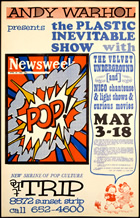
A Trip to Los Angeles
The Velvets are booked to perform a residency at the Los Angeles club The Trip, May 3-18. It is their first trip West and it is a disaster. The Mothers of Invention are the support act and their leader Frank Zappa immediately started putting them down on stage.
The club is closed by the police on the third night. They are being accused of putting on a pornographic exhibition:
"Gerard and Mary acted out our sexual S & M rituals - he licked her boot, she made a show of whippping him - and Gerard panotmimed injecting a drug with a huge toy syringe, but that's all it was: an act. However, the police said that their dances were pornographic, and Lou's lyrics were pornographic. Gimme a break!"
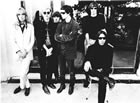
Singer Cher went on record about the show with a snide remark that still haunts her until this day:
"It depressed me. It will replace nothing - except maybe suicide."
The Music Union rules stated that if the band would stick around for their cancelled gigs, they have to be paid by the venue. They are checked into the Castle by Andy Warhol, "a mock-medieval structure in Griffiths Park that rented for $500 a week".

Recording in Los Angeles
The Velvets record tracks for their first album The Velvet Underground & Nico at T.T & G. Studios, Los Angeles, May 1966. Left to right: Sterling Morrison, Nico, John Cale and Lou Reed.
"You gotta laugh when you think the Banana Album was done in a studio where the floorboards were up... they were building it. We had holes in the floor, you had to step around them and be careful. We'd have the viola and the bass going into one Silvertone amp and the guitar and voice going into another."
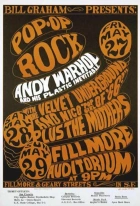
Three nights in San Francisco
The Velvets play three shows (May 27-29) at the recently opened Fillmore in San Francisc, sharing the bill with the Mothers of Invention. There is no love lost between the band and the venue's proprietor, Bill Graham, who took umbrage of the band littering the floor with tangerines and not playing long enough. Sterling Morrison:
"We actually built the light show at the Fillmore. Bill Graham didn't, nor did any San Francisco entrepreneur. When we showed up, Graham had a slide projector with a picture of the moon. We said, 'That's not a light show, Bill, sorry.' That's one of the reasons that Graham really hates us."
Cale remembers:
"Bill Graham didn't appreciate all the songs and improvisations that were going on. He thought we were invading [the San Francisco group's] territory. There wasn't much love lost between us and the West Coast. Lou was always talking about, 'Never mind the flower children, give us the hard drugs!' We were happy that Woodstock ended up in the mud - that kind of resentment was very healthy, I thought."
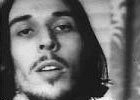
Sunday Morning movie
Sunday Morning, a short silent movie directed by Rosalind Stevenson, features Cale, Sterling Morrison and Lou Reed rehearsing at her apartment. Stevenson:
"Sunday Morning/The Velvet Underground" is a moving portrait of Lou Reed, John Cale, and Sterling Morrison that I filmed in 1966. The film was shot with my Beaulieu R16 camera. There was no pre-planning — we had come back to my apartment after their usual performance in Andy Warhol’s multimedia show The Exploding Plastic Inevitable and decided to film. I shot in black and white 16 mm Tri-X Reversal on 100-foot reels, favoring hand held camera, closeups, and the general sensation of floating with the movement of the camera. They were playing the song Sunday Morning, which was still being composed. John Cale was playing an antique pedal organ that I had at the time. The film was shot silent but in sound speed. The final film is a sound print with the official version of “Sunday Morning” dubbed over and stretched to the length of the film.
Screening History: I showed the film occasionally along with my other films at what were informal screenings during the late sixties, but it remained out of the public view until 1993. In 1993 Channel 4 Television, London approached me about including it in a program they were doing on the Velvet Underground. They licensed the 5 minutes and 31 seconds and aired it in its entirety in December 1993 as part of their 7.5-hour Velvet Underground evening Peel Slowly and See. Debbie Harry introduced it.
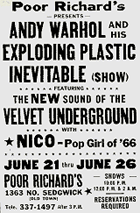
Lead vocals at Poor Richard's in Chicago
On June 21 the Velvets kick off a week long residency at the Poor Richard's club in Chicago without Lou Reed (hepatitis) and Nico (off to Ibiza).
Cale handles the vocals, the first time he sings lead. Maureen Tucker plays bass. Sterling Morrison sticks to his guitar and Angus MacLise returns for this occasion to play drums.
"In Chicago, I was singing lead because Lou had hepatitis, no one knew the difference. We turned our faces to the wall and turned up very loud. Paul Morrisey (later the director of Trash) and Danny Williams had different visions of what the light show should be like and one night I looked up to see them fighting, hitting each other in the middle of a song. Danny Williams just disappeared. They found his clothes by the side of a river, with his car nearby... the whole thing. He used to carry this strobe around with him all the time and no one could figure out why till we found out he kept his amphetamine in it."
Initially booked for June 21-26, the band continues to play there until July 3. Williams would disappear forever later that year. Cale features in the A Walk into the Sea: Danny Williams and the Warhol Factory documentary that was made in 2007 by William's niece Esther Robinson.
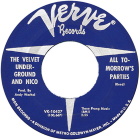
All Tomorrow's Parties / I'll Be Your Mirror single
The first single by The Velvet Underground, All Tomorrow's Parties, is released in July, with I'll Be Your Mirror on the B-side.
It is a mono mix and All Tomorrow's Parties is edited down to 2:45 (the album version is 5:55) in an attempt to get some traction on the airwaves. It sinks without a trace. Included on the Peel Slowly and See box set.
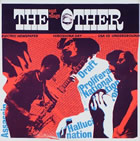
Noise
This track can be found on the Hiroshima edition of The East Village Other Music Newspaper, an 'electric newspaper' album. It was recorded on August 6.
The Velvets perform in the background of an interview with Lucy Johnson, daughter of US president Lyndon Johnson, on her wedding day.
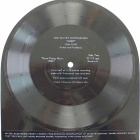
Loop in Aspen Magazine
This instrumental track Loop, composed and played by Cale and credited to The Velvet Underground, is issued on a flexi-disc with issue number 3 (The Pop Art issue) of Aspen magazine. The label says "Guitar and feedback", "First half of a 15-minute recording made with two monaural tape recorders" and "Final groove purposely left open". On the A-side of the flexi-disc is White Wind, a composition by Peter Walker.
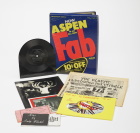
"On the electronic front, there's the free-wheeling manipulation of dials in control rooms; sub-sonic sounds that you feel, not hear; machine noises; feedback; tape echo; anything!"
Aspen was a multimedia magazine that came in a box. It was published on an irregular schedule by business woman Phyllis Johnson. Despite its name the magazine was based in New York. Cale would contribute five poems and a short story to no. 9 (The Psychedelic issue) in 1971.
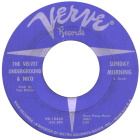
Sunday Morning / Femme Fatale single
The second single by The Velvet Underground, Sunday Morning, is released in November, with Femme Fatale on the B-side. Once again, the record buying people failed to notice it as an essential purchase.